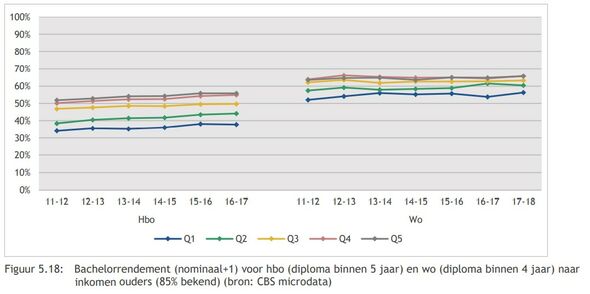Students with low-income parents are affected in many ways. Those students have to work more, borrow more, or both. They experience more financial problems.
This is one of the topics in the Policy Measures Monitor that the Education Ministry has sent to the House of Representatives. In the report, research agency ResearchNed outlines the many consequences of the educational policy, to the extent that they are apparent.
Once young people have started higher education the family income turns out to be even more important than the parents’ level of education. Highly educated parents or not? The researchers say that this has no effect on whether students graduate within the stipulated period.
Particularly in higher vocational education
The financial differences do, however, have an effect, particularly on students in higher vocational education. Of students from the two highest income groups (according to Statistics Netherlands (CBS), above around 70,000 euros) 55 percent obtain their Bachelor’s degree at a university of applied sciences with no more than one year’s delay. The figure is under 40 percent for students from the lowest-income families (up to 27,000 euros).
The gap is also visible, although somewhat narrower, at universities. In Bachelor’s degree programs, where around 60 percent graduate within four years, the difference is roughly ten percentage points
In a short letter accompanying the report Education Minister Robbert Dijkgraaf does not mention the effects of income differences. However, the high costs incurred by students – for accommodation alone – are one of the reasons for the reintroduction of the basic student grant as from September 2023.
Caribbean
Origin is also a factor in the chances of achieving academic success. Only 22 percent of the students from the Caribbeanpart of the Kingdom in higher vocational education graduate with a delay of no more than one year. The figure among students with a non-western migration background is 36 percent, as opposed to 52 percent among students at universities of applied sciences with a western background.
Caribbeanstudents do better at universities: almost half of them obtain a Bachelor’s degree with a delay of no more than one year. There is no longer a difference between students with a non-western background and those with a western background: their academic success is roughly the same.
Men and women
The difference between men and women plays a part in all of this as well. More than 40 percent of the men at universities of applied sciences graduate within five years (i.e. with a delay of no more than one year). The figure among women is 60 percent.
In fact, gender appears to be more important than prior education: in higher vocational education, female students with a secondary vocational education do as well as male students with a pre-university education. Almost 60 percent graduate within five years. The figure for female students with a pre-university education is nearly 80 percent.
At universities, the difference between the results of men and women is less pronounced; nevertheless, 70 percent of the men graduate with a Bachelor’s degree within four years, as opposed to more than 80 percent of the female students.



Discussion